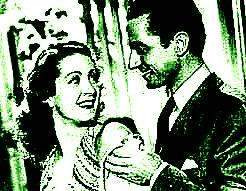Film Review

About the only thing the film has going for it is the scintillating presence of Danielle Darrieux, Continental's biggest star and by far the most seductive actress in French cinema at the time. Cayatte certainly got his money's worth from Darrieux - she doesn't just charm the pants of her audience with her intoxicating grace and penchant for breezy comedy, she also gets to sing the film's two musical numbers - Berger d'autrefois and Les Fleurs sont des mots d'amour - and also performs some suggestive acrobatics on a rope (in her frilly lingerie) that would appear more at home in a 1970s softcore porn movie than a 1940s mainstream comedy. Badly let down by a mediocre script, the male leads Jacques Dumesnil and Bernard Lancret have an uphill struggle trying to maintain our interest in the vicissitudes of their dreary love lives.
Of the supporting artists, only André Alerme, improbably cast as Darrieux's father, gives value for money. There are a few decent gags ("Je connais le chemin," protests the female lead as she almost walks into a cupboard), but mainly it is Darrieux who is the star attraction, dazzling not only with her beauty but also with the generosity of her performance. This was the last film that the actress made for Continental. Immediately afterwards, Danielle Darrieux was coerced by the studio into undertaking a tour of Germany with some other notable performers (including Albert Préjean and Viviane Romance), in the hope of getting her husband Porfirio Rubiros released from the prison camp where he was being detained for spying.
© James Travers 2015
The above content is owned by frenchfilms.org and must not be copied.
Film Synopsis
In a village in Catalonia, René Rivals, a rugby footballer, is pursuing a secret love affair with the wife of his best friend, wine merchant Guy Carbonnel. When Guy becomes suspicious of his wife's infidelity, René persuades Lilian Rander, an acrobat with a travelling circus, to pose as his mistress. At first, Lilian is reluctant to lend her support to this deception, but, pressurised by her father, who is offered a large sum of money by René, she goes along with it for her own amusement. All goes well until René and his false mistress begin to fall in love...© James Travers
The above content is owned by frenchfilms.org and must not be copied.
Similar Films
Here are some other films you may enjoy watching:- Le Plus joli péché du monde (1951)
- Le Dindon (1951)
- La Boîte aux rêves (1945)
- Alexis gentleman chauffeur (1938)
- Tout ça ne vaut pas l'amour (1931)
Other related links:
Film Credits
- Director: André Cayatte
- Script: Tania Einenberg, André Cayatte, Honoré de Balzac (story), Michel Duran (dialogue)
- Cinematographer: Robert Lefebvre
- Music: Maurice Yvain
- Cast: Danielle Darrieux (Lilian Rander), Lise Delamare (Hélène), Monique Joyce (Lætitia), Huguette Vivier (Marina), Gabrielle Fontan (Madame Carbonnel), Bernard Lancret (René Rivals), André Alerme (Rander), Jacques Dumesnil (Guy), Guillaume de Sax (Esquirol), Michel Duran (Mazios), André Gabriello (L'huissier), Charles Blavette (Casimir), Maurice Baquet (Firmin), Marcel Maupi (Bellemain), Paul Barge (Milou), Jean-Marie Boyer (Paulo), Pierre Brulé (Chico), d'Andréa (Prat), Luce Fabiole (Petit rôle), Georges Gosset (Lavielle)
- Country: France
- Language: French
- Support: Black and White
- Runtime: 85 min
- Aka: Twisted Mistress
The very best American film comedies

The very best of the French New Wave

The brighter side of Franz Kafka
